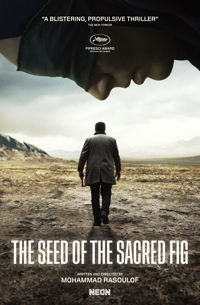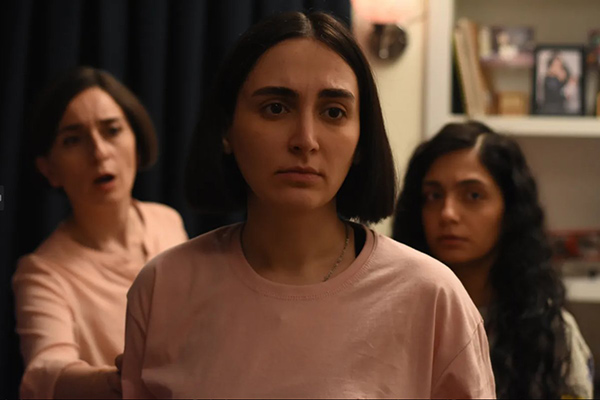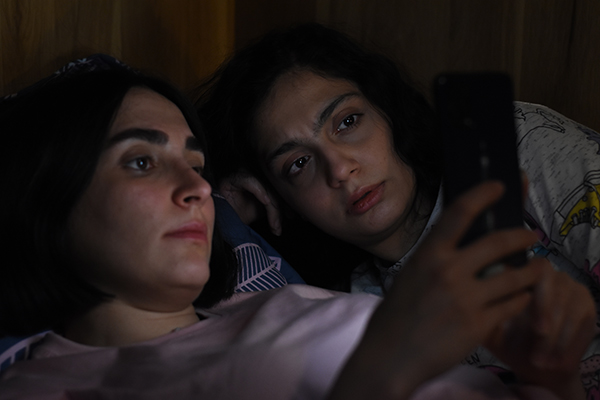Way of the Gun: Rasoulof’s Bold, Blunt Indictment of Iranian Regime
 There’s been little opportunity for artists to clearly or critically speak truth to power in post-revolutionary Iran, where filmmakers and actors are often censored through brute force. Anything considered as propaganda against the state can irreparably affect one’s career, which is why Iranian cinema, like a lot of films made by artists suppressed by political terror, often moves in the realm of metaphor, where intentions and themes are coded. Until now. With his tenth feature film, The Seed of the Sacred Fig, Mohammad Rasoulof launches what constitutes an artistic missile into this supposedly omnipotent dominion, and seems to have drop kicked the hornet’s nest. The poetic title (which sounds like a Nuri Bilge Ceylan film) begins in the realm of metaphor, explaining how the Ficus religiosa (the sacred fig) operates as an invasive, parasitic plant, the seeds of which are spread via bird droppings and take root within the body of other trees and then slowly suffocate it until it completely takes over.
There’s been little opportunity for artists to clearly or critically speak truth to power in post-revolutionary Iran, where filmmakers and actors are often censored through brute force. Anything considered as propaganda against the state can irreparably affect one’s career, which is why Iranian cinema, like a lot of films made by artists suppressed by political terror, often moves in the realm of metaphor, where intentions and themes are coded. Until now. With his tenth feature film, The Seed of the Sacred Fig, Mohammad Rasoulof launches what constitutes an artistic missile into this supposedly omnipotent dominion, and seems to have drop kicked the hornet’s nest. The poetic title (which sounds like a Nuri Bilge Ceylan film) begins in the realm of metaphor, explaining how the Ficus religiosa (the sacred fig) operates as an invasive, parasitic plant, the seeds of which are spread via bird droppings and take root within the body of other trees and then slowly suffocate it until it completely takes over.
Iman (Missagh Zareh) has just been promoted as an investigator, the last step to becoming a judge for Iran’s revolutionary courts, which means he will be not only financially secure but be able to wield political power. Upon his promotion, he’s outfitted with a handgun he shows off to his wife, Najmeh (Soheila Golestani), delighted at the news though wary of the weaponry. They decide it is finally time to tell their two daughters, Rezvan (Mahsa Rostami) and Sana (Setareh Maleki), who only know their father works in the capacity of a civil servant. But this promotion means they will need to be more careful with who they interact with, as his profession is an unpopular one, seeing as how an investigator has the power to issue death sentences. Just as Iman assumes his new position, civil unrest breaks out across Tehran after the killing of Mahsa Amini, murdered for refusing to wear a hijab in public (but the news media claims she suffered a stroke). Women’s Rights advocates and college students take to the streets and are met with brute force, one of them being Revan’s best friend, maimed with buckshot and then arrested in her dormitory. Najmeh tries to keep a lid on her daughters’ unrest, but, suddenly, Iman’s gun goes missing, which could land him in prison for three years if he reports it. Slowly, their comfortable family life begins to crumble as Iman becomes desperate to find his weapon.

There’s nary a dull moment in this nearly three hour running time which begins and ends with a symbol of patriarchal power, the weapons wielded to enforce control becoming the tools of its own dismantling. Much like Maryam Moghadam and Betash Sanaeeha’s My Favorite Cake (2024), which also enraged Iranian authorities, Rasoulof quite candidly showcases the experiences of women with an authenticity which feels quite revolutionary. Rasoulof uses the 2022 death of Mahsa Amini and the ensuing mass protests to construct the climate of the film, the social upheaval a juxtaposition for a man engaged with keeping a corrupt system in place.
A sense of gloomy paranoia engulfs Iman and his wife almost immediately upon his tenuous promotion, and their vulnerability as they await for ‘official housing’ clearly a sign of an eroding system. Rasoulof deftly develops the progressive attitudes of the younger generation through the characterizations and attitudes of his daughters, shaped by access to social media, where witnessing reality is made possible outside the control of state sanctioned propaganda. This slow build pays off as the film segues into an increasingly intense thriller. Iman descends into madness, brutalizing his own family, a microcosm of Iran’s theocratic wielding of power.

The contradictory nature of power is its fragility, a delicate balance where the corrupting reality of absoluteness actually erodes it. The mindset to maintain this control is reminiscent of the William S. Burroughs mantra in Cronenberg’s Naked Lunch – “Annihilate all rational thought.” Rasoulof’s inflamed hierarchy trickles down into the realm of the women who must navigate and survive through normalized behaviors which are downright Orwellian, and the film becomes transfixing when in the hands of its three fascinating women. As Najmeh, Soheila Golestani is obviously the most frustrating, a loving mother and wife trying to run interference while also, impossibly, trying to satisfy both her husband’s and society’s demands. She often devolves into parroting the religious and political conditioning with which she’s been brainwashed. What’s more fascinating is the interplay between Mahsa Rostami and Setareh Maleki and, ultimately, the discovery of who took the damn gun and how it is used.

In the film’s final throes, The Seed of the Sacred Fig most closely resembles the finale of The Shining (1980), a patriarch who’s lost his mind violently turned against his family so drastically they will never be able to go back to ‘the way things were.’ And this is ultimately the powerful message of the film—what has been seen cannot be unseen, what’s experienced cannot be undone. Rasoulof’s film sometimes feels like a blunt instrument, but he’s speaking truth to power through cinema in a way which cannot be misinterpreted.
Reviewed on May 24th at the 2024 Cannes Film Festival – Competition. 172 Mins.
★★★★/☆☆☆☆☆


